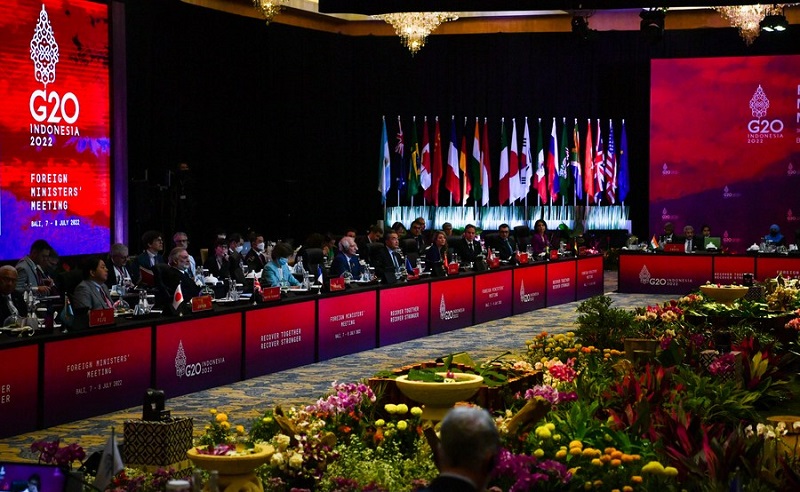China and the United States have not seen eye to eye in recent years. The dangerous rhetoric, the worst of which were the nonsensical ramblings about the “Wuhan virus,” that defined Donald Trump’s years in the White House has been replaced by Joe Biden’s stubbornness toward improving bilateral relations between the two nations. As just one example, President Biden has shown little interest in eliminating the tariffs former President Trump placed on China, even though it is clear the tariffs continue to harm American workers and consumers.
Perhaps something is about to change.
U.S. Secretary of State Antony Blinken met Chinese State Councilor and Foreign Minister Wang Yi during the recent G-20 Foreign Ministers’ Meeting in Indonesia, and there is a glimmer of optimism to which we should pay close attention. No, neither man offered some unexpected proposal that would instantly warm up the Cold War atmosphere between the countries. Rather, they opened the door wider to the possibility that presidents Joe Biden and Xi Jinping could chat either by phone or video in the coming weeks and might meet face-to-face before the end of the calendar year.
There is every reason to believe these phone/video and in-person conversations would address significant issues. That is good; the reality is the United States and China can, should and must work together to seek solutions to vexing problems such as climate change, preparations for future pandemics and globalization.
Considering what President Biden and members of his administration have been saying about China over the roughly 18 months that he has been president, even the smallest of hints that the relationship is improving must be appreciated.
Remember, it was only 16 months ago when Secretary Blinken used the initial meeting between members of the Biden administration and their Chinese counterparts to unload a verbal attack on China. Mr. Blinken suggested that China could not be a real partner for the U.S. or any other Western nation until it stopped trying to undermine the world order. Of course, that world order places the U.S. in a hegemonic position, one that no American official wants to see placed in jeopardy. More recently, Secretary of Defense Lloyd Austin picked up on the theme that China cannot be trusted when he said China must stop posing any threat to Taiwan. In their remarks, and granted Secretary Austin’s were presented in a more mature and statesmanlike way, both men showed a disrespect toward China’s global rise, which is now almost six decades long, and about the realities of a one-China world.

Last weekend at the G-20 meetings in Indonesia, Chinese State Councilor and Foreign Minister Wang Yi indicated his country’s support for improving the dialogue between his country and the United States. However, reports suggested Mr. Wang also made clear that the U.S. needed to recognize some important positions China believes necessary in order for dialogue to advance. Details about the positions have not yet become clear, but the media coverage from Indonesia noted China was interested in the U.S. toning down the often-hostile pronouncements and policies relating to China and acknowledging that there were significant areas in which the two sides could work together to advance peace and stability across the globe.
At one point, Mr. Wang said, “It is important to stay committed to the principles put forward by President Xi Jinping – mutual respect, peaceful coexistence, and win-win cooperation – because that serves the interests of the two countries, two peoples. It is also the shared aspiration of the international community.”
Washington will not look kindly at any talk of “win-win cooperation.” America’s political elite say time and again that “win-win cooperation” is nothing but smoke and mirrors; they claim China is a ruthless negotiator, a country determined to be the only winner in any trade or financial arrangement with another nation. Ironically, recent U.S. efforts to generate positive publicity with southeast Asian nations has come with the choice to deny China any place at the negotiating table. Such a policy runs counter to the needs and interests of those countries, all of which are geographically closer to China.
Finally, let us accept that Secretary Blinken used his meeting with the Chinese counterpart to push the American idea that “China has been aiding Russia in the ongoing Russia-Ukraine war.” Mr. Blinken said, “We are concerned about the PRC’s alignment with Russia,” and that China often “amplified Russian propaganda.”
Critics were quick to note that the U.S. wants China to stay out of the war while at the same time it sends billions of dollars in weapons to Kyiv. Moreover, the propaganda mission in the U.S. that identifies Russian President Vladimir Putin as an evil man determined to rebuild the Soviet Union has the endorsement of the mainstream media. You have to look long and hard to find respectful dissent about Russia’s aims and the role the U.S. and the West played in setting the stage for the war.
Yes, it is possible before 2022 ends that the leaders of the U.S. and China will substantively address global challenges. But the relationship between the two nations remains stuck in neutral, and there is no reason to believe the U.S. is prepared to go from neutral to drive.
The article reflects the author’s opinions, and not necessarily the views of China Focus.